Unit 2 I’ll help to clean up the city parks.Section A(教案 )(共两课时)
文档属性
| 名称 | Unit 2 I’ll help to clean up the city parks.Section A(教案 )(共两课时) |
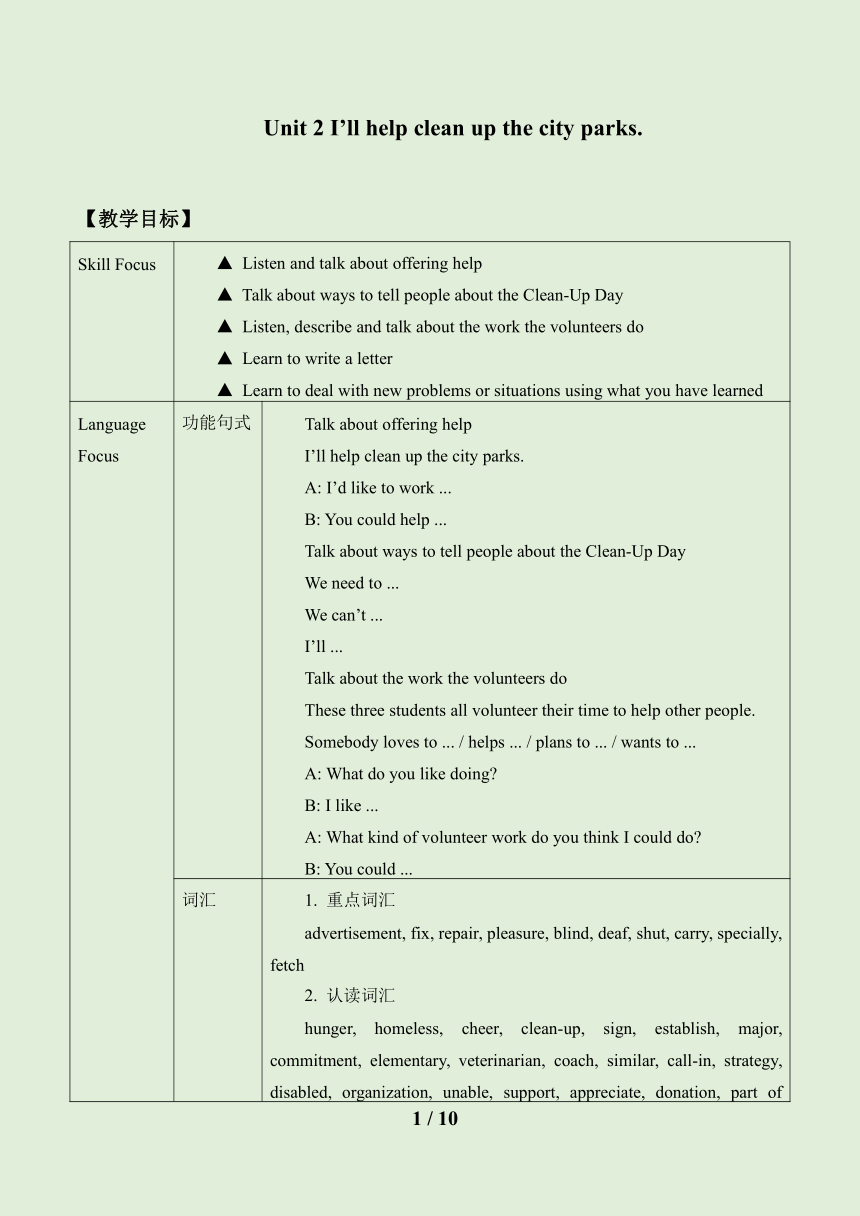
|
|
| 格式 | doc | ||
| 文件大小 | 64.1KB | ||
| 资源类型 | 教案 | ||
| 版本资源 | 人教新目标(Go for it)版 | ||
| 科目 | 英语 | ||
| 更新时间 | 2022-03-23 00:00:00 | ||
图片预览

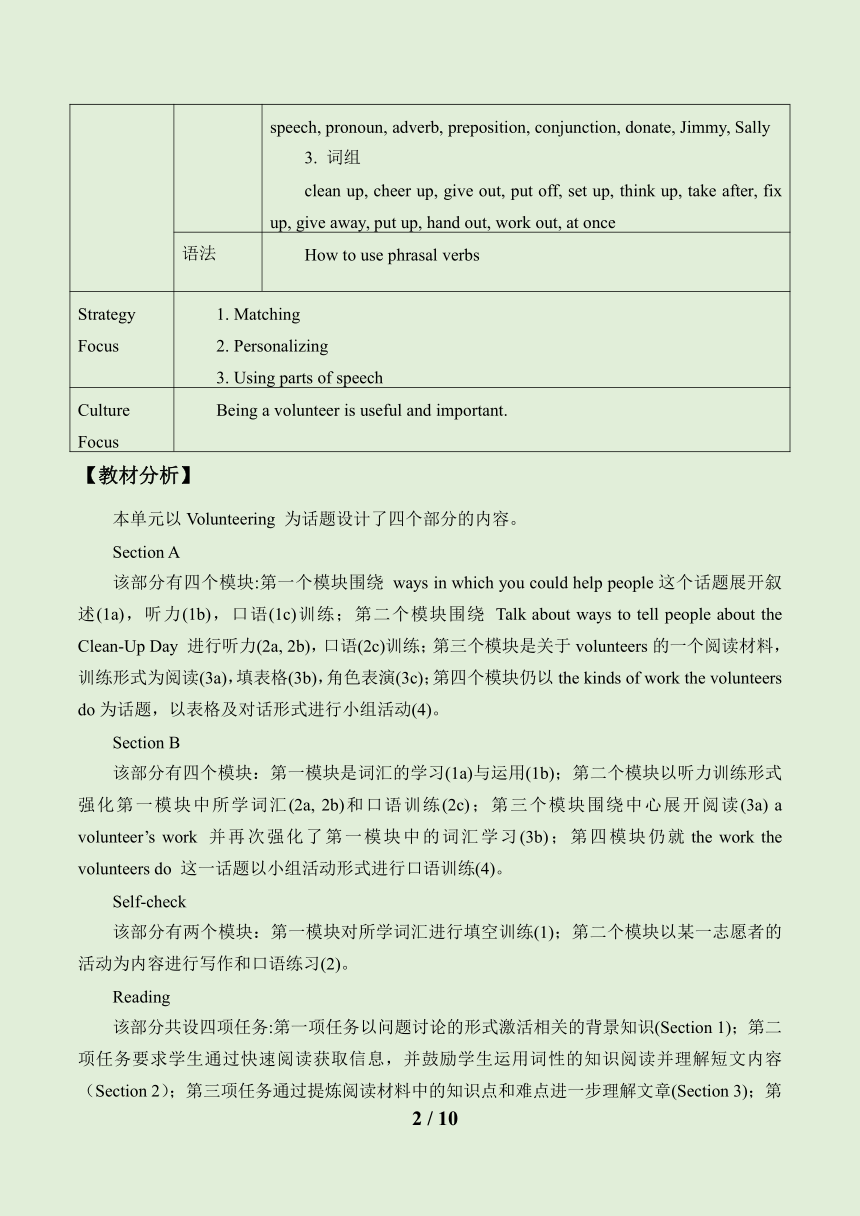
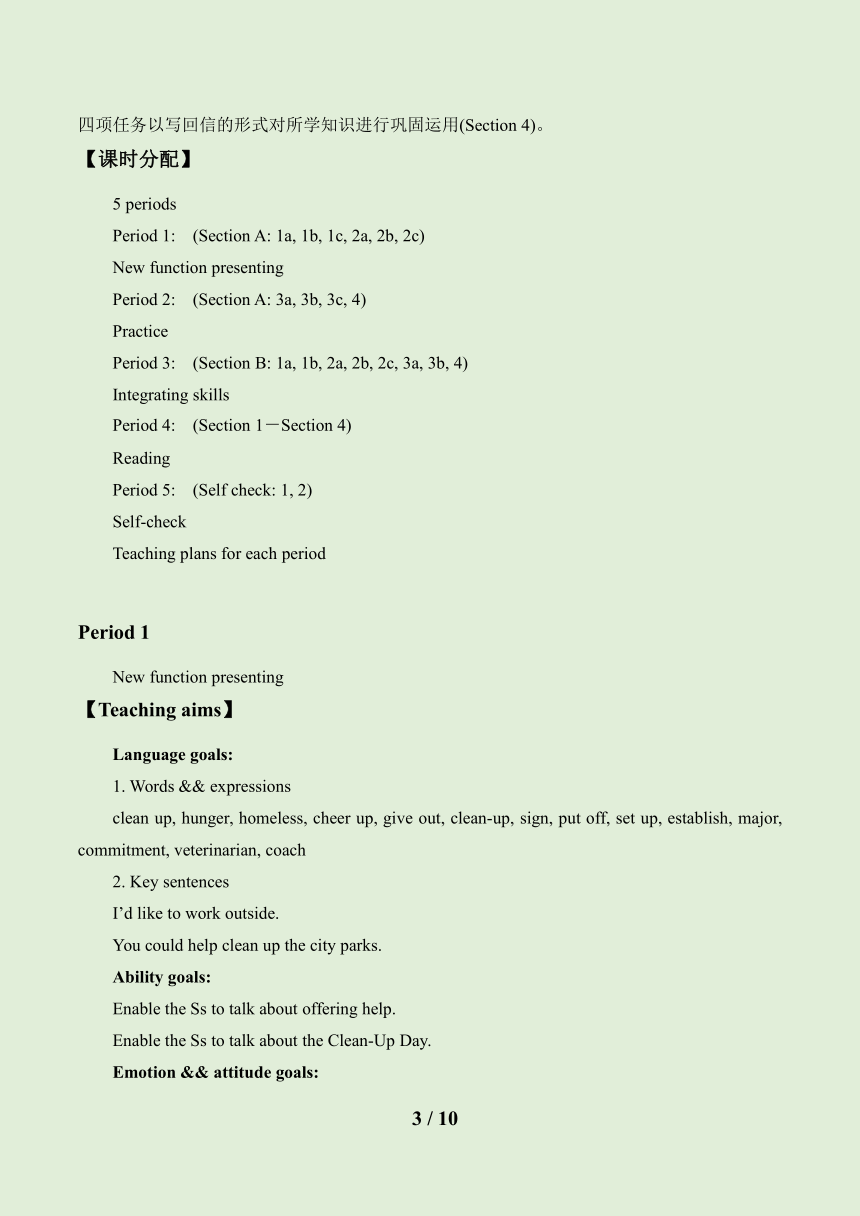
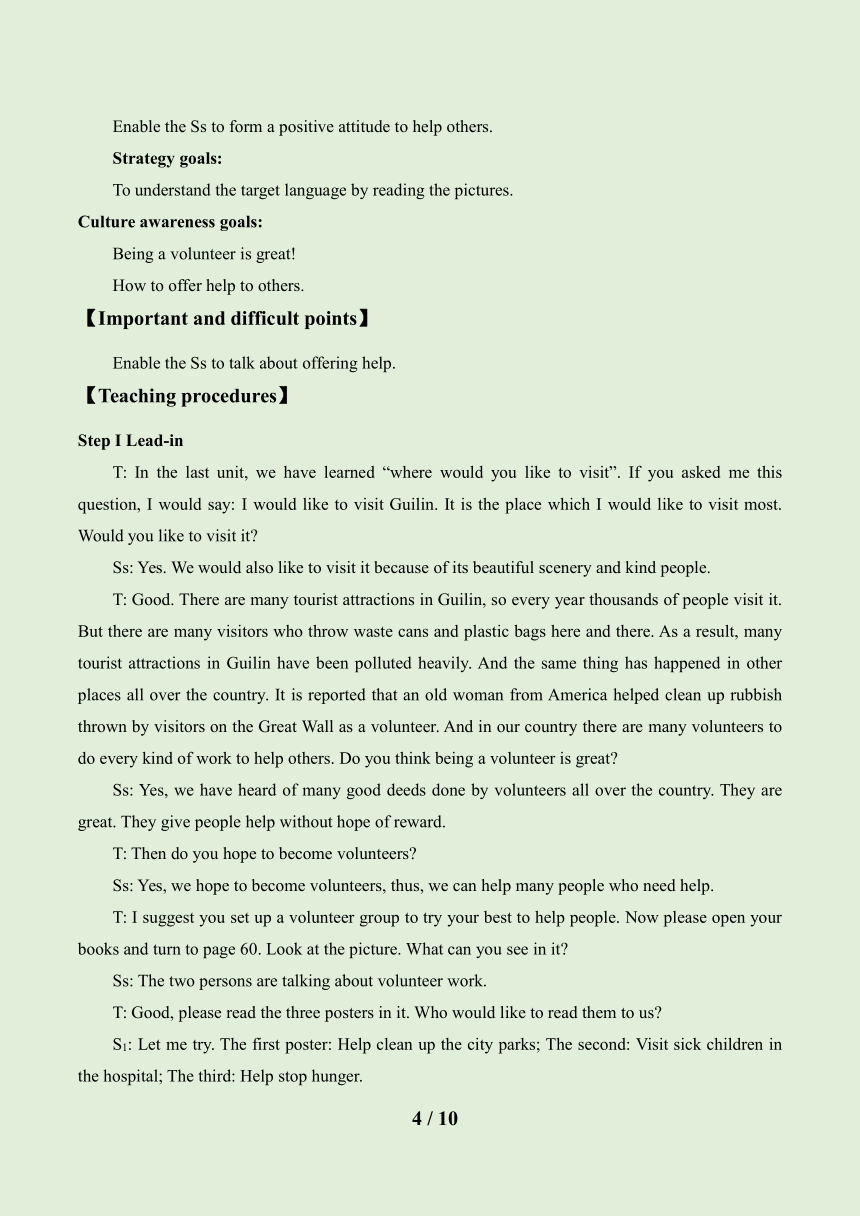
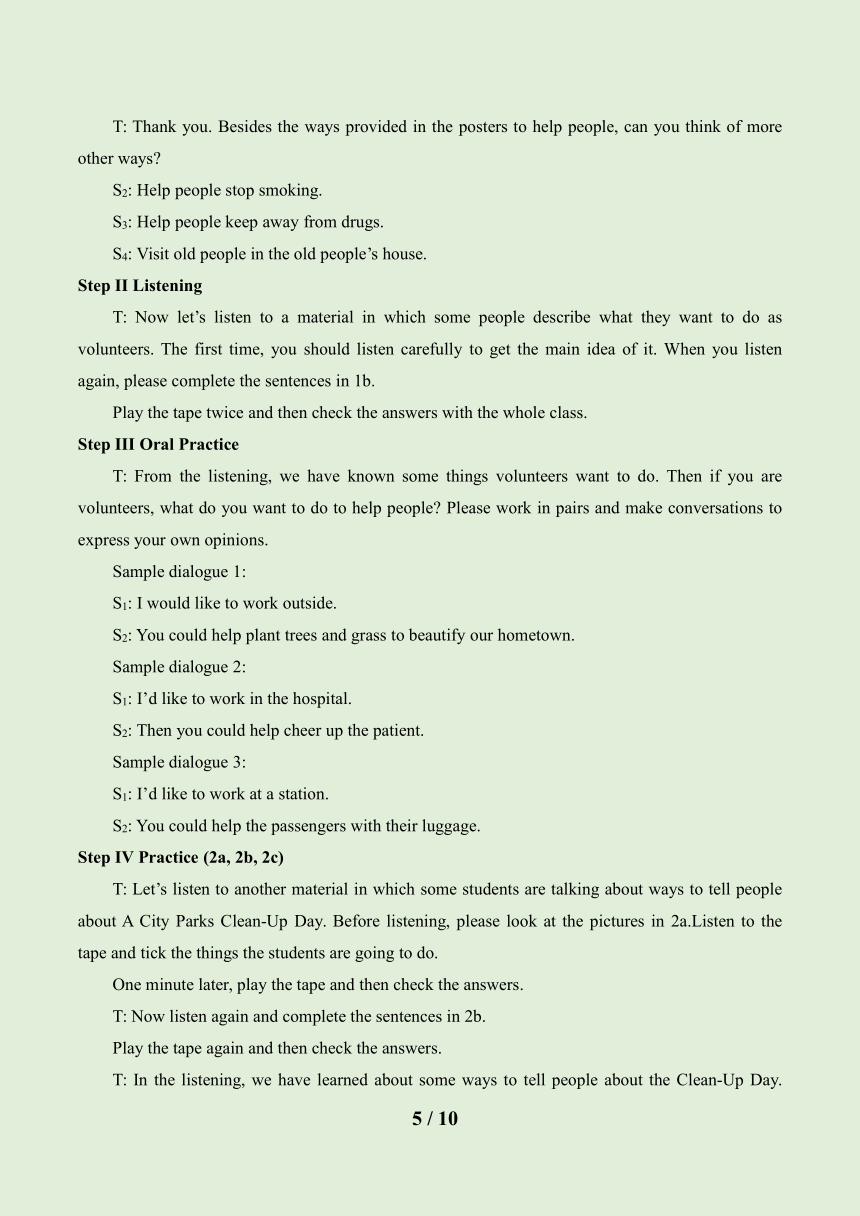
文档简介
Unit 2 I’ll help clean up the city parks.
【教学目标】
Skill Focus ▲ Listen and talk about offering help▲ Talk about ways to tell people about the Clean-Up Day ▲ Listen, describe and talk about the work the volunteers do ▲ Learn to write a letter▲ Learn to deal with new problems or situations using what you have learned
LanguageFocus 功能句式 Talk about offering help I’ll help clean up the city parks.A: I’d like to work ...B: You could help ...Talk about ways to tell people about the Clean-Up DayWe need to ...We can’t ...I’ll ...Talk about the work the volunteers do These three students all volunteer their time to help other people.Somebody loves to ... / helps ... / plans to ... / wants to ...A: What do you like doing B: I like ... A: What kind of volunteer work do you think I could do B: You could ...
词汇 1. 重点词汇advertisement, fix, repair, pleasure, blind, deaf, shut, carry, specially, fetch2. 认读词汇hunger, homeless, cheer, clean-up, sign, establish, major, commitment, elementary, veterinarian, coach, similar, call-in, strategy, disabled, organization, unable, support, appreciate, donation, part of speech, pronoun, adverb, preposition, conjunction, donate, Jimmy, Sally3. 词组clean up, cheer up, give out, put off, set up, think up, take after, fix up, give away, put up, hand out, work out, at once
语法 How to use phrasal verbs
StrategyFocus 1. Matching2. Personalizing3. Using parts of speech
Culture Focus Being a volunteer is useful and important.
【教材分析】
本单元以Volunteering 为话题设计了四个部分的内容。
Section A
该部分有四个模块:第一个模块围绕 ways in which you could help people这个话题展开叙述(1a),听力(1b),口语(1c)训练;第二个模块围绕 Talk about ways to tell people about the Clean-Up Day 进行听力(2a, 2b),口语(2c)训练;第三个模块是关于volunteers的一个阅读材料,训练形式为阅读(3a),填表格(3b),角色表演(3c);第四个模块仍以the kinds of work the volunteers do为话题,以表格及对话形式进行小组活动(4)。
Section B
该部分有四个模块:第一模块是词汇的学习(1a)与运用(1b);第二个模块以听力训练形式强化第一模块中所学词汇(2a, 2b)和口语训练(2c);第三个模块围绕中心展开阅读(3a) a volunteer’s work 并再次强化了第一模块中的词汇学习(3b);第四模块仍就the work the volunteers do 这一话题以小组活动形式进行口语训练(4)。
Self-check
该部分有两个模块:第一模块对所学词汇进行填空训练(1);第二个模块以某一志愿者的活动为内容进行写作和口语练习(2)。
Reading
该部分共设四项任务:第一项任务以问题讨论的形式激活相关的背景知识(Section 1);第二项任务要求学生通过快速阅读获取信息,并鼓励学生运用词性的知识阅读并理解短文内容(Section 2);第三项任务通过提炼阅读材料中的知识点和难点进一步理解文章(Section 3);第四项任务以写回信的形式对所学知识进行巩固运用(Section 4)。
【课时分配】
5 periods
Period 1: (Section A: 1a, 1b, 1c, 2a, 2b, 2c)
New function presenting
Period 2: (Section A: 3a, 3b, 3c, 4)
Practice
Period 3: (Section B: 1a, 1b, 2a, 2b, 2c, 3a, 3b, 4)
Integrating skills
Period 4: (Section 1-Section 4)
Reading
Period 5: (Self check: 1, 2)
Self-check
Teaching plans for each period
Period 1
New function presenting
【Teaching aims】
Language goals:
1. Words && expressions
clean up, hunger, homeless, cheer up, give out, clean-up, sign, put off, set up, establish, major, commitment, veterinarian, coach
2. Key sentences
I’d like to work outside.
You could help clean up the city parks.
Ability goals:
Enable the Ss to talk about offering help.
Enable the Ss to talk about the Clean-Up Day.
Emotion && attitude goals:
Enable the Ss to form a positive attitude to help others.
Strategy goals:
To understand the target language by reading the pictures.
Culture awareness goals:
Being a volunteer is great!
How to offer help to others.
【Important and difficult points】
Enable the Ss to talk about offering help.
【Teaching procedures】
Step I Lead-in
T: In the last unit, we have learned “where would you like to visit”. If you asked me this question, I would say: I would like to visit Guilin. It is the place which I would like to visit most. Would you like to visit it
Ss: Yes. We would also like to visit it because of its beautiful scenery and kind people.
T: Good. There are many tourist attractions in Guilin, so every year thousands of people visit it. But there are many visitors who throw waste cans and plastic bags here and there. As a result, many tourist attractions in Guilin have been polluted heavily. And the same thing has happened in other places all over the country. It is reported that an old woman from America helped clean up rubbish thrown by visitors on the Great Wall as a volunteer. And in our country there are many volunteers to do every kind of work to help others. Do you think being a volunteer is great
Ss: Yes, we have heard of many good deeds done by volunteers all over the country. They are great. They give people help without hope of reward.
T: Then do you hope to become volunteers
Ss: Yes, we hope to become volunteers, thus, we can help many people who need help.
T: I suggest you set up a volunteer group to try your best to help people. Now please open your books and turn to page 60. Look at the picture. What can you see in it
Ss: The two persons are talking about volunteer work.
T: Good, please read the three posters in it. Who would like to read them to us
S1: Let me try. The first poster: Help clean up the city parks; The second: Visit sick children in the hospital; The third: Help stop hunger.
T: Thank you. Besides the ways provided in the posters to help people, can you think of more other ways
S2: Help people stop smoking.
S3: Help people keep away from drugs.
S4: Visit old people in the old people’s house.
Step II Listening
T: Now let’s listen to a material in which some people describe what they want to do as volunteers. The first time, you should listen carefully to get the main idea of it. When you listen again, please complete the sentences in 1b.
Play the tape twice and then check the answers with the whole class.
Step III Oral Practice
T: From the listening, we have known some things volunteers want to do. Then if you are volunteers, what do you want to do to help people Please work in pairs and make conversations to express your own opinions.
Sample dialogue 1:
S1: I would like to work outside.
S2: You could help plant trees and grass to beautify our hometown.
Sample dialogue 2:
S1: I’d like to work in the hospital.
S2: Then you could help cheer up the patient.
Sample dialogue 3:
S1: I’d like to work at a station.
S2: You could help the passengers with their luggage.
Step IV Practice (2a, 2b, 2c)
T: Let’s listen to another material in which some students are talking about ways to tell people about A City Parks Clean-Up Day. Before listening, please look at the pictures in 2a.Listen to the tape and tick the things the students are going to do.
One minute later, play the tape and then check the answers.
T: Now listen again and complete the sentences in 2b.
Play the tape again and then check the answers.
T: In the listening, we have learned about some ways to tell people about the Clean-Up Day. Read the model dialogue in 2c and then work in pairs to try to make your own dialogues using the information in the listening.
Sample dialogue 1:
S1: We need to hand out advertisements after school.
S2: Let’s have supper first.
S1: No, we can’t put off handing out the advertisements. Clean-Up Day is only two weeks from now.
Sample dialogue 2:
S1: We need to put up the signs.
S2: Let’s drink some water first, I’m thirsty.
S1: No, we can’t put off putting up the signs. Clean-Up Day is five days from now.
Sample dialogue 3:
S1: We need to put up a notice.
S2: Let’s have supper first.
S1: No, we can’t put off putting up the notice. Clean-Up Day is just two days from now.
Step V Summary and Homework
T: In this class, we’ve mainly talked about offering help. After class, try to make more dialogues to practice it. And learn the phrasal verbs cheer up, set up and come up with in Grammar Focus. If you cannot fully understand their meanings and usage, please look them up in the dictionary.
Period 2
Practice
【Teaching aims】
Language goals:
1. Words && expressions:
take after, fix up, give away, not ... any more, call up, hand out, call in, strategy, work out
2. Key sentences:
What do you like doing
You could help coach a football team for little kids.
Ability goals:
Enable the Ss to choose what to do as volunteers according to their interests.
Emotion && attitude goals:
Try to be helpful to others.
Strategy goals:
Read and learn to be a volunteer.
Culture awareness goals:
Further understand the meaning of being a volunteer.
【Important and difficult points】
How to help the Ss choose the volunteer work.
【Teaching procedures】
Step I Revision (Grammar Focus)
T: Yesterday I asked you to learn three phrasal verbs in Grammar Focus after class. Have you understood them
Ss: Yes.
T: Good. Now listen to my story. In the story there are some phrasal verbs, please pick them out:
The children are going to have a party at 7:00 tonight. They wrote the place down on the blackboard to let everyone know. Some students have come up with some new ideas for games at the party. They must have fun tonight. Look, several girls are setting up the food tables. Do they have to do it right now Yes, they can’t put it off, for its 6:30 now. But some boys aren’t happy to do that kind of work. Can you cheer them up and remind them that they should clean up after the party
S1: Cheer up.
S2: Set up and write down.
S3: Come up with.
S4: Put off and clean up.
T: Good. Now please look at more phrasal verbs on the screen.
Show the following phrasal verbs on the screen.
1. run out of 用完, 耗尽
2. take after (外貌, 性格等) 与 (父母) 相似
3. fix up 修理, 修补
4. give away 分发, 赠送
5. work out 结局, 至最后, 结果为
T: Have you grasped them
Ss: Yes.
T: OK! Now please look at the sentences on the screen, and then tell me the usage of one kind of phrasal verbs — v. + adv.
Show some sentences on the screen.
Our time is running out.
We are running out of time.
He gave away most of his money to the poor. (He gave most of his money away to the poor.)
His money is little, but to our surprise, he gave it away to the poor.
T: Who would like to tell me the usage of this kind of phrasal verbs Have a try.
S5: Let me try. In the v.+ adv. phrase, v. can be vi. or vt.. If the verb is vi. When a noun will be added, there have to be a prep after the phrase. If the verb is vt., when a noun will be added, it can be added either between v. and adv. or after the phrase. The point we should pay attention to is: When a pronoun will be added, it has to be put between v. and adv.
T: Good. Your answer is perfect.
Step II Reading (3a, 3b)
T: In your spare time, what do you like doing
S5: I like reading books.
S6: I like singing songs.
T: OK! Have you ever thought to choose volunteer work according to your interests
Ss: Oh, sorry.
T: Don’t worry. Please read the passage. Read and find out: What can you learn
Ss: We should choose our volunteer work according to our interests.
T: You are clever. Now please read the passage again. When you read, please underline the kinds of work the volunteers do and circle the reasons why they like their work.
A few minutes later, check the answers.
Sample answers:
The kinds of work the volunteers do:
Work in the after-school care center, helping young children to read; work in an animal hospital; sing for groups of people at the city hospital to cheer them up.
The reasons why they like their work:
Not only do they feel good about helping other people, but they get to spend time doing what they love to do; has learned more about animals; has met some wonderful people at the hospital.
T: Now look at the chart in 3b. What kinds of volunteer work do you think these students could do
S7: I think Hui could help coach a football team for little kids.
S8: I think Xiao Tang could tell the stories he has written to the little children in hospital to cheer them up.
S9: I think Joy could help project films in a cinema.
S10: I think Wei could play music she likes to the patients.
Step III Role Play (3c)
T: Please work in pairs to make dialogues using information in 3b and the model dialogue in the box.
Sample conversation 1:
S1: I’d like to join the school volunteer project, but I’m not sure what I should do.
S2: What do you like doing
S1: I like reading.
S2: Well, you could help young children read.
Sample conversation 2:
S1: I’d like to join the school volunteer project, but I’m not sure what I should do.
S2: What do you like doing
S1: I love music.
S2: Well, you could sing some beautiful songs for the patients in hospital.
Step IV Writing and Speaking (4)
T: Now please write down three things you like to do in 4. Then make dialogues with your partners to ask for what kinds of volunteer work you could do.
A sample list of answers:
1. Things I like to do:
I like singing.
I like cooking.
I like playing computer games.
2. Volunteer work I could do:
I could sing for the patients in hospital.
I could help cook for the old without children in our community.
I could help the old in our community learn to surf the Internet.
Sample dialogue 1:
S1: I like singing. What kind of volunteer work do you think I could do
S2: You could sing for the patients in hospital.
Sample dialogue 2:
S1: I like cooking. What kind of volunteer work do you think I could do
S2: You could help cook for the old without children in our community.
Sample dialogue 3:
S1: I like playing computer games. What kind of volunteer work do you think I could do
S2: You could help the old in our community learn to surf the Internet.
Step V Homework
T: Try to join the school volunteer project and do something for other people after class.
1 / 10
【教学目标】
Skill Focus ▲ Listen and talk about offering help▲ Talk about ways to tell people about the Clean-Up Day ▲ Listen, describe and talk about the work the volunteers do ▲ Learn to write a letter▲ Learn to deal with new problems or situations using what you have learned
LanguageFocus 功能句式 Talk about offering help I’ll help clean up the city parks.A: I’d like to work ...B: You could help ...Talk about ways to tell people about the Clean-Up DayWe need to ...We can’t ...I’ll ...Talk about the work the volunteers do These three students all volunteer their time to help other people.Somebody loves to ... / helps ... / plans to ... / wants to ...A: What do you like doing B: I like ... A: What kind of volunteer work do you think I could do B: You could ...
词汇 1. 重点词汇advertisement, fix, repair, pleasure, blind, deaf, shut, carry, specially, fetch2. 认读词汇hunger, homeless, cheer, clean-up, sign, establish, major, commitment, elementary, veterinarian, coach, similar, call-in, strategy, disabled, organization, unable, support, appreciate, donation, part of speech, pronoun, adverb, preposition, conjunction, donate, Jimmy, Sally3. 词组clean up, cheer up, give out, put off, set up, think up, take after, fix up, give away, put up, hand out, work out, at once
语法 How to use phrasal verbs
StrategyFocus 1. Matching2. Personalizing3. Using parts of speech
Culture Focus Being a volunteer is useful and important.
【教材分析】
本单元以Volunteering 为话题设计了四个部分的内容。
Section A
该部分有四个模块:第一个模块围绕 ways in which you could help people这个话题展开叙述(1a),听力(1b),口语(1c)训练;第二个模块围绕 Talk about ways to tell people about the Clean-Up Day 进行听力(2a, 2b),口语(2c)训练;第三个模块是关于volunteers的一个阅读材料,训练形式为阅读(3a),填表格(3b),角色表演(3c);第四个模块仍以the kinds of work the volunteers do为话题,以表格及对话形式进行小组活动(4)。
Section B
该部分有四个模块:第一模块是词汇的学习(1a)与运用(1b);第二个模块以听力训练形式强化第一模块中所学词汇(2a, 2b)和口语训练(2c);第三个模块围绕中心展开阅读(3a) a volunteer’s work 并再次强化了第一模块中的词汇学习(3b);第四模块仍就the work the volunteers do 这一话题以小组活动形式进行口语训练(4)。
Self-check
该部分有两个模块:第一模块对所学词汇进行填空训练(1);第二个模块以某一志愿者的活动为内容进行写作和口语练习(2)。
Reading
该部分共设四项任务:第一项任务以问题讨论的形式激活相关的背景知识(Section 1);第二项任务要求学生通过快速阅读获取信息,并鼓励学生运用词性的知识阅读并理解短文内容(Section 2);第三项任务通过提炼阅读材料中的知识点和难点进一步理解文章(Section 3);第四项任务以写回信的形式对所学知识进行巩固运用(Section 4)。
【课时分配】
5 periods
Period 1: (Section A: 1a, 1b, 1c, 2a, 2b, 2c)
New function presenting
Period 2: (Section A: 3a, 3b, 3c, 4)
Practice
Period 3: (Section B: 1a, 1b, 2a, 2b, 2c, 3a, 3b, 4)
Integrating skills
Period 4: (Section 1-Section 4)
Reading
Period 5: (Self check: 1, 2)
Self-check
Teaching plans for each period
Period 1
New function presenting
【Teaching aims】
Language goals:
1. Words && expressions
clean up, hunger, homeless, cheer up, give out, clean-up, sign, put off, set up, establish, major, commitment, veterinarian, coach
2. Key sentences
I’d like to work outside.
You could help clean up the city parks.
Ability goals:
Enable the Ss to talk about offering help.
Enable the Ss to talk about the Clean-Up Day.
Emotion && attitude goals:
Enable the Ss to form a positive attitude to help others.
Strategy goals:
To understand the target language by reading the pictures.
Culture awareness goals:
Being a volunteer is great!
How to offer help to others.
【Important and difficult points】
Enable the Ss to talk about offering help.
【Teaching procedures】
Step I Lead-in
T: In the last unit, we have learned “where would you like to visit”. If you asked me this question, I would say: I would like to visit Guilin. It is the place which I would like to visit most. Would you like to visit it
Ss: Yes. We would also like to visit it because of its beautiful scenery and kind people.
T: Good. There are many tourist attractions in Guilin, so every year thousands of people visit it. But there are many visitors who throw waste cans and plastic bags here and there. As a result, many tourist attractions in Guilin have been polluted heavily. And the same thing has happened in other places all over the country. It is reported that an old woman from America helped clean up rubbish thrown by visitors on the Great Wall as a volunteer. And in our country there are many volunteers to do every kind of work to help others. Do you think being a volunteer is great
Ss: Yes, we have heard of many good deeds done by volunteers all over the country. They are great. They give people help without hope of reward.
T: Then do you hope to become volunteers
Ss: Yes, we hope to become volunteers, thus, we can help many people who need help.
T: I suggest you set up a volunteer group to try your best to help people. Now please open your books and turn to page 60. Look at the picture. What can you see in it
Ss: The two persons are talking about volunteer work.
T: Good, please read the three posters in it. Who would like to read them to us
S1: Let me try. The first poster: Help clean up the city parks; The second: Visit sick children in the hospital; The third: Help stop hunger.
T: Thank you. Besides the ways provided in the posters to help people, can you think of more other ways
S2: Help people stop smoking.
S3: Help people keep away from drugs.
S4: Visit old people in the old people’s house.
Step II Listening
T: Now let’s listen to a material in which some people describe what they want to do as volunteers. The first time, you should listen carefully to get the main idea of it. When you listen again, please complete the sentences in 1b.
Play the tape twice and then check the answers with the whole class.
Step III Oral Practice
T: From the listening, we have known some things volunteers want to do. Then if you are volunteers, what do you want to do to help people Please work in pairs and make conversations to express your own opinions.
Sample dialogue 1:
S1: I would like to work outside.
S2: You could help plant trees and grass to beautify our hometown.
Sample dialogue 2:
S1: I’d like to work in the hospital.
S2: Then you could help cheer up the patient.
Sample dialogue 3:
S1: I’d like to work at a station.
S2: You could help the passengers with their luggage.
Step IV Practice (2a, 2b, 2c)
T: Let’s listen to another material in which some students are talking about ways to tell people about A City Parks Clean-Up Day. Before listening, please look at the pictures in 2a.Listen to the tape and tick the things the students are going to do.
One minute later, play the tape and then check the answers.
T: Now listen again and complete the sentences in 2b.
Play the tape again and then check the answers.
T: In the listening, we have learned about some ways to tell people about the Clean-Up Day. Read the model dialogue in 2c and then work in pairs to try to make your own dialogues using the information in the listening.
Sample dialogue 1:
S1: We need to hand out advertisements after school.
S2: Let’s have supper first.
S1: No, we can’t put off handing out the advertisements. Clean-Up Day is only two weeks from now.
Sample dialogue 2:
S1: We need to put up the signs.
S2: Let’s drink some water first, I’m thirsty.
S1: No, we can’t put off putting up the signs. Clean-Up Day is five days from now.
Sample dialogue 3:
S1: We need to put up a notice.
S2: Let’s have supper first.
S1: No, we can’t put off putting up the notice. Clean-Up Day is just two days from now.
Step V Summary and Homework
T: In this class, we’ve mainly talked about offering help. After class, try to make more dialogues to practice it. And learn the phrasal verbs cheer up, set up and come up with in Grammar Focus. If you cannot fully understand their meanings and usage, please look them up in the dictionary.
Period 2
Practice
【Teaching aims】
Language goals:
1. Words && expressions:
take after, fix up, give away, not ... any more, call up, hand out, call in, strategy, work out
2. Key sentences:
What do you like doing
You could help coach a football team for little kids.
Ability goals:
Enable the Ss to choose what to do as volunteers according to their interests.
Emotion && attitude goals:
Try to be helpful to others.
Strategy goals:
Read and learn to be a volunteer.
Culture awareness goals:
Further understand the meaning of being a volunteer.
【Important and difficult points】
How to help the Ss choose the volunteer work.
【Teaching procedures】
Step I Revision (Grammar Focus)
T: Yesterday I asked you to learn three phrasal verbs in Grammar Focus after class. Have you understood them
Ss: Yes.
T: Good. Now listen to my story. In the story there are some phrasal verbs, please pick them out:
The children are going to have a party at 7:00 tonight. They wrote the place down on the blackboard to let everyone know. Some students have come up with some new ideas for games at the party. They must have fun tonight. Look, several girls are setting up the food tables. Do they have to do it right now Yes, they can’t put it off, for its 6:30 now. But some boys aren’t happy to do that kind of work. Can you cheer them up and remind them that they should clean up after the party
S1: Cheer up.
S2: Set up and write down.
S3: Come up with.
S4: Put off and clean up.
T: Good. Now please look at more phrasal verbs on the screen.
Show the following phrasal verbs on the screen.
1. run out of 用完, 耗尽
2. take after (外貌, 性格等) 与 (父母) 相似
3. fix up 修理, 修补
4. give away 分发, 赠送
5. work out 结局, 至最后, 结果为
T: Have you grasped them
Ss: Yes.
T: OK! Now please look at the sentences on the screen, and then tell me the usage of one kind of phrasal verbs — v. + adv.
Show some sentences on the screen.
Our time is running out.
We are running out of time.
He gave away most of his money to the poor. (He gave most of his money away to the poor.)
His money is little, but to our surprise, he gave it away to the poor.
T: Who would like to tell me the usage of this kind of phrasal verbs Have a try.
S5: Let me try. In the v.+ adv. phrase, v. can be vi. or vt.. If the verb is vi. When a noun will be added, there have to be a prep after the phrase. If the verb is vt., when a noun will be added, it can be added either between v. and adv. or after the phrase. The point we should pay attention to is: When a pronoun will be added, it has to be put between v. and adv.
T: Good. Your answer is perfect.
Step II Reading (3a, 3b)
T: In your spare time, what do you like doing
S5: I like reading books.
S6: I like singing songs.
T: OK! Have you ever thought to choose volunteer work according to your interests
Ss: Oh, sorry.
T: Don’t worry. Please read the passage. Read and find out: What can you learn
Ss: We should choose our volunteer work according to our interests.
T: You are clever. Now please read the passage again. When you read, please underline the kinds of work the volunteers do and circle the reasons why they like their work.
A few minutes later, check the answers.
Sample answers:
The kinds of work the volunteers do:
Work in the after-school care center, helping young children to read; work in an animal hospital; sing for groups of people at the city hospital to cheer them up.
The reasons why they like their work:
Not only do they feel good about helping other people, but they get to spend time doing what they love to do; has learned more about animals; has met some wonderful people at the hospital.
T: Now look at the chart in 3b. What kinds of volunteer work do you think these students could do
S7: I think Hui could help coach a football team for little kids.
S8: I think Xiao Tang could tell the stories he has written to the little children in hospital to cheer them up.
S9: I think Joy could help project films in a cinema.
S10: I think Wei could play music she likes to the patients.
Step III Role Play (3c)
T: Please work in pairs to make dialogues using information in 3b and the model dialogue in the box.
Sample conversation 1:
S1: I’d like to join the school volunteer project, but I’m not sure what I should do.
S2: What do you like doing
S1: I like reading.
S2: Well, you could help young children read.
Sample conversation 2:
S1: I’d like to join the school volunteer project, but I’m not sure what I should do.
S2: What do you like doing
S1: I love music.
S2: Well, you could sing some beautiful songs for the patients in hospital.
Step IV Writing and Speaking (4)
T: Now please write down three things you like to do in 4. Then make dialogues with your partners to ask for what kinds of volunteer work you could do.
A sample list of answers:
1. Things I like to do:
I like singing.
I like cooking.
I like playing computer games.
2. Volunteer work I could do:
I could sing for the patients in hospital.
I could help cook for the old without children in our community.
I could help the old in our community learn to surf the Internet.
Sample dialogue 1:
S1: I like singing. What kind of volunteer work do you think I could do
S2: You could sing for the patients in hospital.
Sample dialogue 2:
S1: I like cooking. What kind of volunteer work do you think I could do
S2: You could help cook for the old without children in our community.
Sample dialogue 3:
S1: I like playing computer games. What kind of volunteer work do you think I could do
S2: You could help the old in our community learn to surf the Internet.
Step V Homework
T: Try to join the school volunteer project and do something for other people after class.
1 / 10
同课章节目录
- Unit 1 What's the matter?
- Section A
- Section B
- Unit 2 I'll help to clean up the city parks.
- Section A
- Section B
- Unit 3 Could you please clean your room?
- Section A
- Section B
- Unit 4 Why don't you talk to your parents?
- Section A
- Section B
- Unit 5 What were you doing when the rainstorm came
- Section A
- Section B
- Review of Units 1-5
- Unit 6 An old man tried to move the mountains.
- Section A
- Section B
- Unit 7 What's the highest mountain in the world?
- Section A
- Section B
- Unit 8 Have you read Treasure Island yet?
- Section A
- Section B
- Unit 9 Have you ever been to a museum?
- Section A
- Section B
- Unit 10 I've had this bike for three years.
- Section A
- Section B
